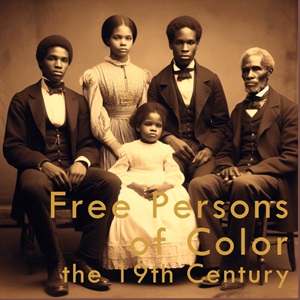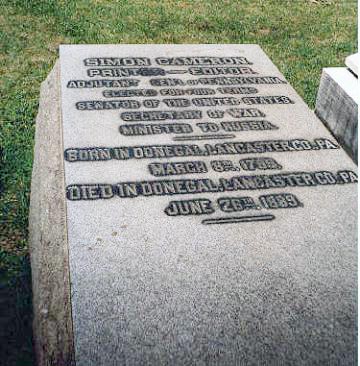

 |
 |
|
Study Areas Free Persons of Color |
Harrisburg CemeteryBlack History Perspectives Tour |
Tour stop 6: Simon Cameron, The Emancipation QuestionSimon Cameron (1799-1889)Few stories of political dynasties can rival the tale of Simon Cameron's hold on Pennsylvania politics, with his behind-the-scenes maneuverings and deals made literally in smoke-filled rooms. Despite tales of corruption, political chicanery and outright graft, no one can deny that this man was for many years the most powerful and influential person in Pennsylvania politics. Cameron's interest in politics developed through his interest in printing, which began at age 10 as a printer's apprentice. While barely out of his teenage years he assumed the editorship of several small newspapers and in 1821 came to Harrisburg where he bought a small newspaper, the Harrisburg Republican, renamed it the Intelligencer, and began cultivating important political connections. Newspapers in the eighteenth century were often little more than political organs for various parties or candidates. While some existed only for the duration of a political campaign, established and financed by political party monies, most stayed in business longer and served their communities as legitimate newspapers, all the while endorsing a specific party or political movement. Simon Cameron's career as editor soon led to his appointment as State Printer, and then Adjutant General of Pennsylvania. He was twice elected to the U.S. Senate, first as a Democrat, and the second time with the backing of a coalition of Democratic, Republican, and American party legislators.
It was during Simon Cameron's tenure as Secretary of War that he proposed that slaves freed by Union troops be immediately emancipated and used in the war effort, either as laborers or as armed troops. From his December 1, 1861 Annual Report, Cameron writes: It it shall be found that the men who have been held by the rebels as slaves are capable of bearing arms and performing efficient military service, it is the right, and may become the duty, of this Government to arm and equip them, and employ their services against the rebels, under proper military regulations, discipline and command.Unfortunately, Lincoln felt that the nation was not ready for emancipation and arming African Americans as soldiers, and censored Cameron's report, demanding the removal of the portions referring to emancipation and arming former slaves. Cameron complied, but sent uncensored copies of the report to the newspapers, infuriating those members of the administration who opposed hard-line dealings with the southern states. The resulting furor was one of several reasons that Lincoln replaced Cameron with Edwin Stanton, assigning the Pennsylvanian to the recently vacated post of Minister to Russia. Cameron's advocacy of equal rights for African Americans went well beyond political expediency. In the 1866 Pennsylvania gubernatorial race, during an atmosphere charged with racial tensions, Democrats named Cameron as one of several Republicans favoring Black suffrage, and called for all who opposed that issue to vote for the Democratic candidate. Prior to that, in November 1865, Harrisburg welcomed the returning Pennsylvania African American regiments in a grand reception. Speakers included Reverend Stephen Smith, T. Morris Chester, William Howard Day, Jacob C. White, Jr., and Octavius V. Catto. The entire reception made a special stop at the Cameron Mansion on Front Street (now the Harris-Cameron Mansion, and Simon Cameron came out to review the troops and address the procession, being the only white person asked to participate in the proceedings. He said: I cannot let this opportunity pass without thanking the African soldiers for the compliment they have paid me, but more than all to thank them for the great service which they have been to their country in the terrible rebellion. I never doubted that the people of African descent would play a great part in this struggle, and am proud to say, that all my anticipations have been more than realized. Your services, offered in the early part of the war, were refused; but when the struggle became one of life and death, then the country gladly received you, and, thank God, you nobly redeemed all you promised. (Applause.)
It is interesting to note that Cameron's daughter Margaretta married Richard J. Haldeman, whose racist political rhetoric stands in stark contrast to Cameron's stated views. In the 1880's, Cameron worked with Harrisburg author James H. W. Howard on a history of the United States Colored Troops, although it appears that work was never published. Next:"For the Burial of Such White People"
SourcesBiography of Simon Cameron, Information about Cameron's political career is from Gerald G. Eggert's book Harrisburg Industrializes: The Coming of Factories to an American Community (1993, The Pennsylvania State University Press, University Park, PA). Specific information regarding Simon Cameron is in the book Walking Tour of Harrisburg Cemetery, 150th Anniversary Edition (1995, Harrisburg, PA). Cameron's Annual Report, as Secretary of War, from Edward McPherson, The Political History of the United States of America, during the Great Rebellion (Washington, D.C., 1865), p. 294. Cameron's address to the crowd at the reception of the returning Pennsylvania United States Colored Troops is from The Christian Recorder, November 18, 1865. |
|
Afrolumens Project Home | Enslavement | Underground Railroad | 19thCentu ry | 20th Century
Original material on this page copyright 2024 Afrolumens Project
Photographs on this page by George F. Nagle. No reuse without permission.
The url of this page is https://www.afrolumens.com/rising_free/hbgcem07.html